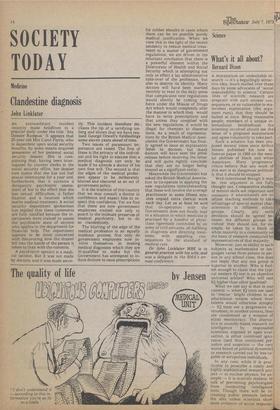SOCIETY TODAY
Medicine
Clandestine diagnosis
John Linklater
An extraordinary incident recently made headlines in a popular daily under the title 'Sex Dossier Rumpus.' It appears that 25-year-old Mrs Carol Parris, who is dependent upon social security benefits, by some means acquired possession of her personal social security dossier. She is complaining that, having been interrogated by counter clerks in the social security office, her dossier now states that she has not had sexual intercourse for a year and, furthermore, that it contains a derogatory psychiatric assessment of her to the effect that she has sexual difficulties, a father fixation and a neurosis which merits medical treatment. A social security department spokesman has implied that these comments are fully justified because the interviewers were trained to assess the psychiatric state of anyone who applies to the department for financial help, The department appears to be more concerned with discovering how the dossier fell into the hands of the person it refers to than with the contents.
A psychiatric opinion is a medical opinion. But it was not made by doctors, and it was made secre
tly. This incident therefore dis-, closes the tip of a terrifying iceberg and shows that we have realised George Orwell's forebodings some eleven years ahead of time.
Two issues of paramount importance are raised. The first of these is the privacy of the individual and his right to assume that a medical diagnosis can only be made if he attends a doctor of his own free will. The second is that the edges of the medical profession appear to be deliberately blurred and obscured as an act of government policy.
It is the tradition of this country that we may consult a doctor in confidence and expect him to respect this confidence. Yet we find that there are now government employees trained not only to poach in the intimate preserves of medical psychiatry, but to do so clandestinely.
The blurring of the edge of the medical profession is an equally insidious process. Not only do government employees now involve themselves in making medical diagnoses which they are ill-qualified to make but the Government has attempted to induce doctors to issue prescriptions for rubber sheaths in cases where there can be no possible purely medical justification. When we view this in the light of the recent tendency to reduce medical treatment to a matter of government regulations, we are driven to the reluctant conclusion that there is a powerful element within the Directorate of Health and Social Security which is attempting not only to effect a lay administrative take-over of the profession, but also to destroy its. identity. Many doctors will have been startled recently to read in the daily press that complicated new regulations would shortly be coming into force under the Misuse of Drugs Act which would completely alter the manner in which they would have to write prescriptions and that unless they complied with the new regulations, it would be illegal for chemists to dispense them. As a result of representations by the British Medical Association the Government has finally agreed to issue an explanatory letter to doctors, but many doctors will have seen the press release before receiving the letter and will quite rightly conclude that they are no longer being treated as a significant entity.
Meanwhile the Government has asked the British Medical Association to co-operate in applying the new regulations notwithstanding that these will involve the average practitioner in some fifteen minutes unpaid extra clerical work each day. Let us at least be sure that co-operation with • the Government does not finally lead to a situation in which medicine is practised by a handful of physicians rigorously controlled by an army of civil servants, all dabbling in diagnosis and directing treatment, with appalling consequences to the standard of medical care.
Dr John Linklater MBE is in general practice with his wife, and was a delegate to the BMA's annual conference.












































 Previous page
Previous page